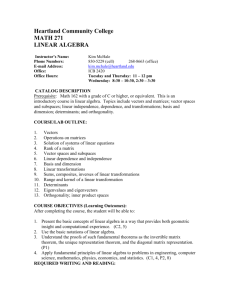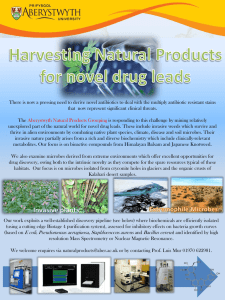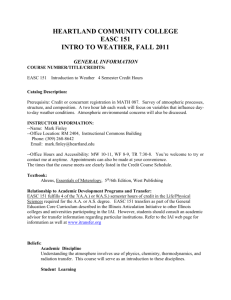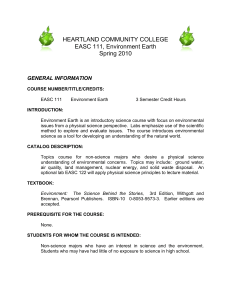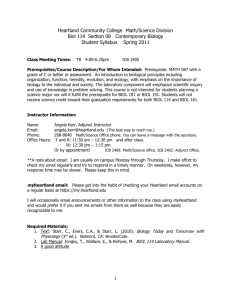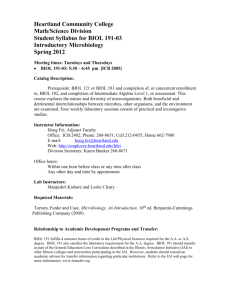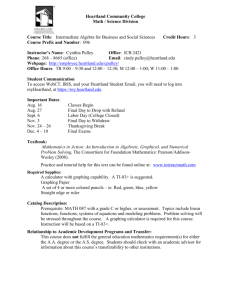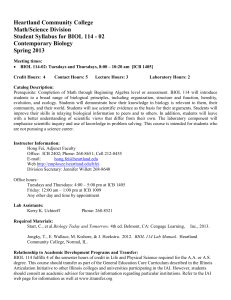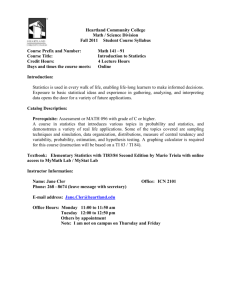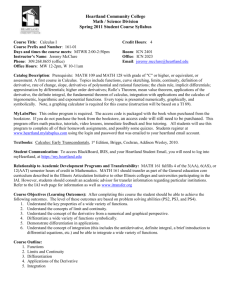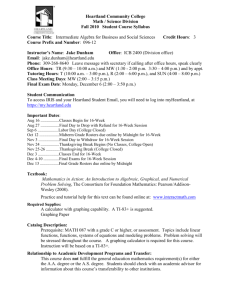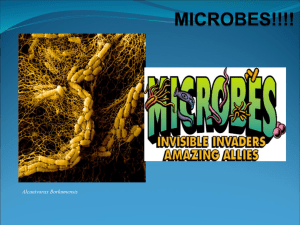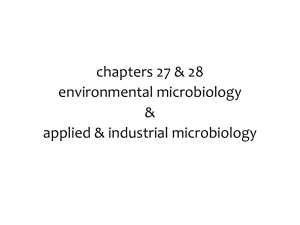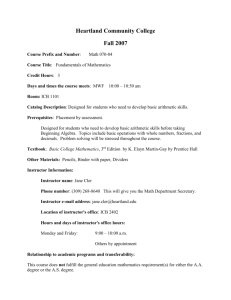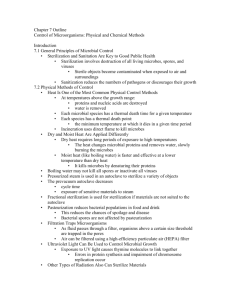BIOL 191 Kishore - Heartland Community College
advertisement
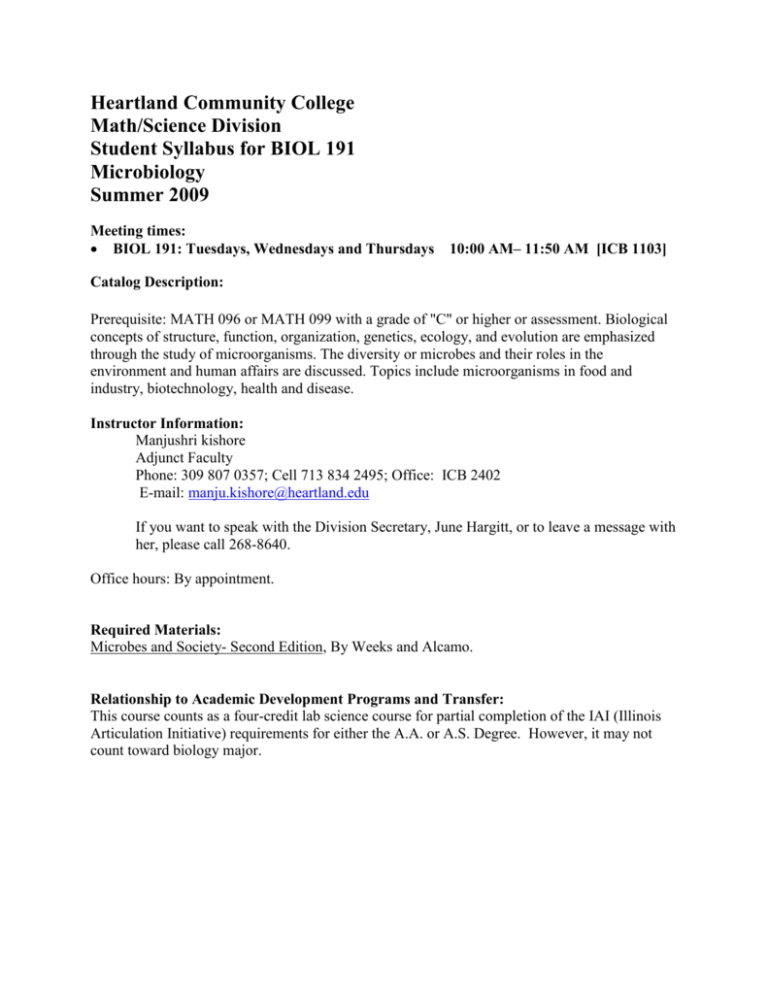
Heartland Community College Math/Science Division Student Syllabus for BIOL 191 Microbiology Summer 2009 Meeting times: BIOL 191: Tuesdays, Wednesdays and Thursdays 10:00 AM– 11:50 AM [ICB 1103] Catalog Description: Prerequisite: MATH 096 or MATH 099 with a grade of "C" or higher or assessment. Biological concepts of structure, function, organization, genetics, ecology, and evolution are emphasized through the study of microorganisms. The diversity or microbes and their roles in the environment and human affairs are discussed. Topics include microorganisms in food and industry, biotechnology, health and disease. Instructor Information: Manjushri kishore Adjunct Faculty Phone: 309 807 0357; Cell 713 834 2495; Office: ICB 2402 E-mail: manju.kishore@heartland.edu If you want to speak with the Division Secretary, June Hargitt, or to leave a message with her, please call 268-8640. Office hours: By appointment. Required Materials: Microbes and Society- Second Edition, By Weeks and Alcamo. Relationship to Academic Development Programs and Transfer: This course counts as a four-credit lab science course for partial completion of the IAI (Illinois Articulation Initiative) requirements for either the A.A. or A.S. Degree. However, it may not count toward biology major. Course Objective: At the completion of course student will Master laboratory and reasoning skills employed in the study of microbes. Examine prevailing philosophical concepts applied in the study of science. Understand relationships between microbial ubiquity and diversity to their effects on the biosphere and environmental preservation. Gain a historical perspective concerning the study of microbes and its relation to scientific inquiry, technology, and social outcomes. Learn basic biological principles using microbes as study organisms: basic chemistry, structure and function, genetics, ecology, and evolution. Relate metabolic principles to microbial uses in industry and food production/safety. Relate genetic principles to microbial roles in DNA technologies. Understand the importance of microbial normal flora to human health along with human defense against pathogens. Familiarize with the mechanisms of infectious diseases and antimicrobial agents. Evaluate the mechanisms underlying resistance to antimicrobial agents. Familiarize and understand the intensity of contemporary topics of emerging diseases and the Microbial Genome Project / Genomes to Life. Classroom Objective and Expectations: Students must be prepared and should have every thing required for the class. Students are expected to be calm, courteous and respectful. Students will work on an in class group activity followed by presentation of the project. Students will answer thought questions related to the topics covered in class as part of ongoing assessment. Attendance is important part of the grade, if student misses 3 classes he/ she will lose all the attendance points and have to cover up for those missed class by completing an out of class assignment. In order to receive credit for any in-class, non-lab assignment, the student must be present in class on the date the assignment is done. There will be no make-ups. In case of documented illness or death in the family, accident, or military duties when a student must miss class for more than one week, student must contact the instructor as soon as possible to discuss the situation. Assessment: Students will be continuously assessed on their performance during in class activities and assignments, their final grade will be based on the total number of points earned. Components of final grade: 1. 2. 3. 4. 5. 6. Quizzes Video questionnaires Group project and presentation Home Work assignments Field trip paper Attendance points Grade Calculation: Quizzes = 50 points Total points possible = 200 points Videos=10 points Total points possible =40 Thought questions=5 Total possible points=40 In class group project and presentation= 25 Field trip=10 Attendance = 10 points Total points possible = 325 points The laboratory portion of the course comprises 25% of the final grade. However, a grade of 70% or higher in the lab portion of the course is required in order to pass the course. Failure to achieve 70% or more in the lab portion will result in a grade of "F" for the entire course regardless of the grade in the lecture portion. Grading scale: 90%-100% 80%-89% 70%-79% 60%-69% Below 60% A B C D F Make-up policies: No make up for the quizzes, homework and in class activity. Incomplete Grade An Incomplete grade may be justified to a student if the student encounters extreme circumstances (e.g., serious illness, accident, death or serious illness in the immediate family) toward the end of the semester and is unable to complete the semester. The student must be in a position to pass the class if the Incomplete is given. The student must sign a form requiring him/her to finish the class by next semester. Required Writing and Reading Students must read the textbook to prepare for classroom activities. Students will write about biological news and answer questions on quizzes and labs. Academic Integrity Plagiarism is the presenting of others’ ideas as if they were your own. When you write a paper, create a project, do a presentation or create anything original, it is assumed that all the work, except for that which is attributed to another author or creator, is your own. Plagiarism is considered a serious academic offense and may take the following forms: 1. Copying word-for-word from another source and not giving that source credit. 2. Paraphrasing the work of another and not giving that source credit. 3. Adopting a particularly apt phrase as your own. 4. Using an image or a copy of an image without crediting its source. 5. Paraphrasing someone else’s line of thinking in the development of a topic as if it were your own. 6. Receiving excessive help from a friend or elsewhere, or using another project as if it were your own. [Adapted from the Modern Language Association’s MLA Handbook for Writers of Research Papers. New York: MLA, 1995: 26] Note that word-for-word copying is not the only form of plagiarism. The penalties for plagiarism may be severe, ranging from failure on the particular piece of work, failure in the course or expulsion from school in extreme cases. Academic Support Center Services http://www.heartland.edu/asc/ 1. Library The Library, located in the Student Commons Building at the Raab Road campus, provides Heartland students with a full range of resources including books, online journal databases, videos, newspapers, periodicals, reserves, and interlibrary loan. Librarians are available to assist in locating information. For more information please call the Library (309) 268-8200 or (309) 268-8292. http://www.heartland.edu/LIBRARY/index.html 2. Tutoring Services Heartland Community College offers tutoring in various forms at no cost to Heartland students at the Tutoring and Testing Center in Normal and at the Pontiac and Lincoln Centers. Tutors are available at convenient times throughout the week. Study groups are also available by request. For more information about services available at each location, please call the Tutoring and Testing Center in Normal at (309) 268-8231, the Pontiac Center at (815) 842-6777, or the Lincoln Center (217) 735-1731. http://www.heartland.edu/asc/tutor.html 3. Testing Services The Tutoring and Testing Center provides a secure testing environment for students who are enrolled in online, hybrid, and other distance learning courses; have a documented disability; or need to take a make-up exam. Testing accommodations for students having documented disabilities must be arranged by the student through the Office of Disability Services, and Testing Services will only administer make-up exams at the request of the instructor. Contact Testing Services at (309) 268-8231 for more information. http://www.heartland.edu/asc/testing.html 4. Open Computing Lab The Open Computing Lab provides free computing for HCC students at convenient times throughout the week. The computer lab is staffed by trained Lab Assistants and offers the use of approximately 70 computers, a scanner, a laser printer, and an electric typewriter. http://www.heartland.edu/asc/computerlab.html Documented disability If you have a documented disability and wish to discuss academic accommodations, please contact Anita Moore at 268-8249 or anita.moore@heartland.edu **Notice of Cancelled Class Sessions** Cancelled class sessions, for all HCC classes, will be listed under Cancelled Class Meetings in the A-Z Index and under Academic Information in the Current Students page on the HCC Web site. Go to http://www.heartland.edu/classCancellations/ to learn what classes have been cancelled for that day and the upcoming week. Be sure to check the last column, which might contain a message from the instructor. **The schedule, especially the lab dates, can only be tentative sometimes and subject to change Week 1, June 2, 3 and 4 Introduction, The Microbial World and Microbes in perspective, Molecules of Life Week 2, June 9, 10 and 11 The Structure and replication of DNA and RNA, Protein Synthesis Week 3, June 16, 17 and 18 Prokaryotic cell structure, Growth and metabolism Quiz on June 16th Week 4, June 23, 24 and 25 Microbial Genetics, controlling microbes Week 5, June 30, July 1 and 2 Eukaryotic cells and microbes Quiz on June 30th Week 6, July 7, 8 and 9 Viruses and Viral diseases Videos “Surviving AIDS”, “Body Story” Week 7, July 14, 15 and 16 Microbes – The Good, the Bad and the Ugly Video “The most dangerous woman in America Typhoid Mary” July 16th field trip to Ropp Cheese Quiz on July 14th Week 8, July 21, 22 and 23 Microbes – The Good, the Bad and the Ugly Video “Ebola, Plague Fighter” Review Final Term: July 28
